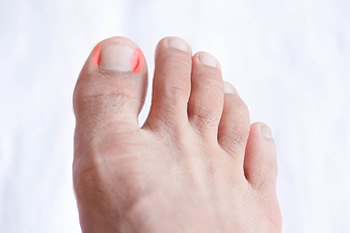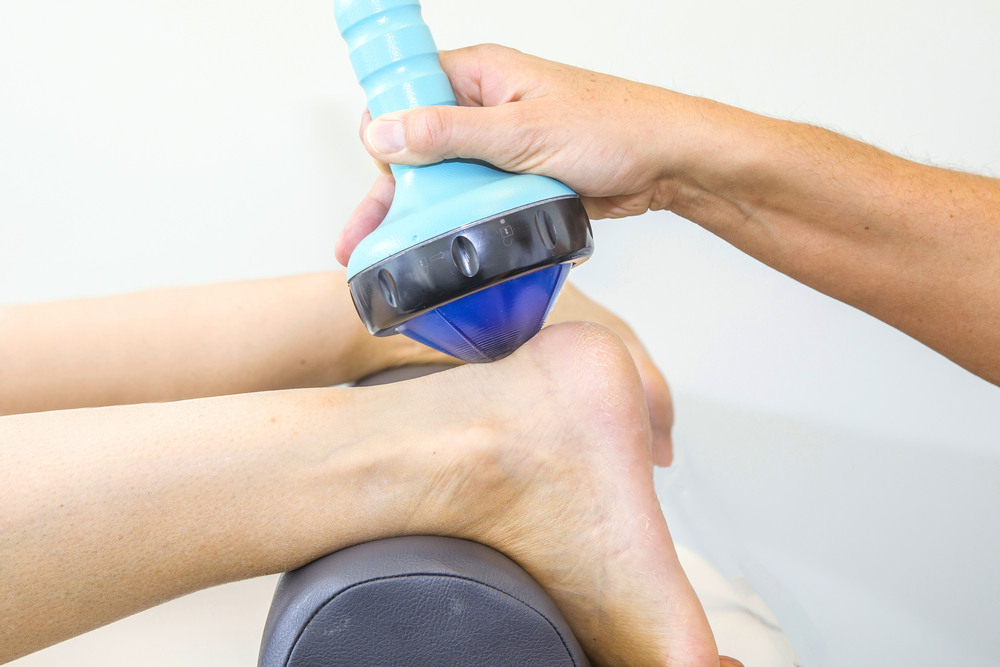Connect With Us
Blog
Items filtered by date: December 2020
Causes and Treatments for an Ingrown Toenail
 An ingrown toenail occurs when a curved toenail grows into the skin on the sides of the nail. The toenail digs into the skin and causes pain, redness, and swelling as the skin grows around the nail. If left untreated, it can cause a bacterial infection. Ingrown toenails are often caused by trauma, tightly fitting shoes, or cutting the toenails at an angle instead of straight across. Those who notice an ingrown toenail should treat it immediately by soaking it in warm water, drying it with a towel, and bandaging it. If there is significant swelling, pain, inflammation or discharge, the toenail is likely infected. Ingrown toenails that won’t heal, occur frequently, or are infected should be looked at by a podiatrist.
An ingrown toenail occurs when a curved toenail grows into the skin on the sides of the nail. The toenail digs into the skin and causes pain, redness, and swelling as the skin grows around the nail. If left untreated, it can cause a bacterial infection. Ingrown toenails are often caused by trauma, tightly fitting shoes, or cutting the toenails at an angle instead of straight across. Those who notice an ingrown toenail should treat it immediately by soaking it in warm water, drying it with a towel, and bandaging it. If there is significant swelling, pain, inflammation or discharge, the toenail is likely infected. Ingrown toenails that won’t heal, occur frequently, or are infected should be looked at by a podiatrist.
Ingrown toenails can become painful if they are not treated properly. For more information about ingrown toenails, contact Michael Tomey, DPM of Cary Foot & Ankle Specialists. Our doctor can provide the care you need to keep you pain-free and on your feet.
Ingrown Toenails
Ingrown toenails occur when a toenail grows sideways into the bed of the nail, causing pain, swelling, and possibly infection.
Causes
- Bacterial infections
- Improper nail cutting such as cutting it too short or not straight across
- Trauma to the toe, such as stubbing, which causes the nail to grow back irregularly
- Ill-fitting shoes that bunch the toes too close together
- Genetic predisposition
Prevention
Because ingrown toenails are not something found outside of shoe-wearing cultures, going barefoot as often as possible will decrease the likeliness of developing ingrown toenails. Wearing proper fitting shoes and using proper cutting techniques will also help decrease your risk of developing ingrown toenails.
Treatment
Ingrown toenails are a very treatable foot condition. In minor cases, soaking the affected area in salt or antibacterial soaps will not only help with the ingrown nail itself, but also help prevent any infections from occurring. In more severe cases, surgery is an option. In either case, speaking to your podiatrist about this condition will help you get a better understanding of specific treatment options that are right for you.
If you have any questions please feel free to contact our office located in Cary, NC . We offer the newest diagnostic and treatment technologies for all your foot and ankle needs.
Plantar Warts Can Be Treated!
Methods That Can Help to Prevent Running Injuries
 Implementing methods that can help to prevent running injuries is crucial to thoroughly enjoying the sport of running or jogging. Good habits can consist of warming up and cooling down before and after running, and it is beneficial to wear shoes that fit correctly. Additionally, it helps to gradually increase speed and mileage, as this can build endurance over time. Professional runners state it is best to increase the miles that are run by 10 percent or less per week. If you would like more information about foot conditions that can occur from running, running injuries, and how to prevent them, please consult with a podiatrist.
Implementing methods that can help to prevent running injuries is crucial to thoroughly enjoying the sport of running or jogging. Good habits can consist of warming up and cooling down before and after running, and it is beneficial to wear shoes that fit correctly. Additionally, it helps to gradually increase speed and mileage, as this can build endurance over time. Professional runners state it is best to increase the miles that are run by 10 percent or less per week. If you would like more information about foot conditions that can occur from running, running injuries, and how to prevent them, please consult with a podiatrist.
All runners should take extra precaution when trying to avoid injury. If you have any concerns about your feet, contact Michael Tomey, DPM of Cary Foot & Ankle Specialists. Our doctor will treat your foot and ankle needs.
How to Prevent Running Injuries
There are a lot of mistakes a runner can make prior to a workout that can induce injury. A lot of athletes tend to overstretch before running, instead of saving those workouts for a post-run routine. Deep lunges and hand-to-toe hamstring pulls should be performed after a workout instead of during a warmup. Another common mistake is jumping into an intense routine before your body is physically prepared for it. You should try to ease your way into long-distance running instead of forcing yourself to rush into it.
More Tips for Preventing Injury
- Incorporate Strength Training into Workouts - This will help improve the body’s overall athleticism
- Improve and Maintain Your Flexibility – Stretching everyday will help improve overall performance
- “Warm Up” Before Running and “Cool Down” Afterward – A warm up of 5-10 minutes helps get rid of lactic acid in the muscles and prevents delayed muscle soreness
- Cross-Training is Crucial
- Wear Proper Running Shoes
- Have a Formal Gait Analysis – Poor biomechanics can easily cause injury
If you have any questions, please feel free to contact our office located in Cary, NC . We offer the newest diagnostic and treatment technologies for all your foot care needs.
Are You Suffering From Plantar Fasciitis?
 Plantar fasciitis occurs when the ligament that runs along the bottom of the foot, called the plantar fascia, becomes inflamed. Plantar fasciitis causes pain in the heel, which is usually worse in the morning, after prolonged standing, or after an intense workout. It can also be associated with a heel spur, which occurs as a spike of bone that points out from the heel bone. Common risk factors for developing plantar fasciitis include playing sports that put stress on the heel bone, being flat footed, being middle-aged, obesity, pregnancy, and spending a lot of time on your feet. Common methods of relief include taking nonsteroidal anti-inflammatory drugs, resting the foot, and wearing proper footwear or orthotics. If you are suffering from heel pain, don't hesitate to speak with a podiatrist.
Plantar fasciitis occurs when the ligament that runs along the bottom of the foot, called the plantar fascia, becomes inflamed. Plantar fasciitis causes pain in the heel, which is usually worse in the morning, after prolonged standing, or after an intense workout. It can also be associated with a heel spur, which occurs as a spike of bone that points out from the heel bone. Common risk factors for developing plantar fasciitis include playing sports that put stress on the heel bone, being flat footed, being middle-aged, obesity, pregnancy, and spending a lot of time on your feet. Common methods of relief include taking nonsteroidal anti-inflammatory drugs, resting the foot, and wearing proper footwear or orthotics. If you are suffering from heel pain, don't hesitate to speak with a podiatrist.
Plantar fasciitis can be very painful and inconvenient. If you are experiencing heel pain or symptoms of plantar fasciitis, contact Michael Tomey, DPM from Cary Foot & Ankle Specialists. Our doctor can provide the care you need to keep you pain-free and on your feet.
What Is Plantar Fasciitis?
Plantar fasciitis is the inflammation of the thick band of tissue that runs along the bottom of your foot, known as the plantar fascia, and causes mild to severe heel pain.
What Causes Plantar Fasciitis?
- Excessive running
- Non-supportive shoes
- Overpronation
- Repeated stretching and tearing of the plantar fascia
How Can It Be Treated?
- Conservative measures – anti-inflammatories, ice packs, stretching exercises, physical therapy, orthotic devices
- Shockwave therapy – sound waves are sent to the affected area to facilitate healing and are usually used for chronic cases of plantar fasciitis
- Surgery – usually only used as a last resort when all else fails. The plantar fascia can be surgically detached from the heel
While very treatable, plantar fasciitis is definitely not something that should be ignored. Especially in severe cases, speaking to your doctor right away is highly recommended to avoid complications and severe heel pain. Your podiatrist can work with you to provide the appropriate treatment options tailored to your condition.
If you have any questions please feel free to contact our office located in Cary, NC . We offer the newest diagnostic and treatment technologies for all your foot and ankle needs.
Chronic Pain May Be Reduced With Shockwave Therapy
Patients who suffer from chronic pain in the feet and ankles may be interested in learning about a treatment option that is known as shockwave therapy. It is capable of transmitting shock waves through the skin to the damaged tissue. It is known to accelerate the healing process and may be responsible in providing adequate pain relief. The benefits of receiving this type of treatment can include minimal time for administering the shockwave therapy, and it eliminates the need for anesthesia. Some of the ailments shockwave therapy may be successful in treating include Achilles tendon injuries and plantar fasciitis. If you are interested in learning more about this type of treatment, it is suggested that you confer with a podiatrist.
Shockwave therapy is a treatment commonly used to treat various injuries and conditions, particularly plantar fasciitis in the feet. To learn more, consult with Michael Tomey, DPM from Cary Foot & Ankle Specialists. Our doctor can provide the care you need to keep you pain-free and on your feet.
Shockwave Therapy
Shockwave therapy is a new treatment option designed to treat bone conditions such as tennis elbow, shoulder pain, and others. Shockwave therapy uses high intensity sound waves that are directed to the affected tissues of the body with pinpoint accuracy. The effects are very beneficial, leading to a production of collagen fibers, eliminating inflammation.
Who Benefits from Shockwave?
Shockwave is recommended for patients suffering from heel pain and associated problems. Heel pain is a common condition which can be caused by obesity, overexertion, and spending a substantial amount of time on hard floors with your feet exposed and unsupported.
Fast and Easy
The therapy is actually a simple process that can leave patients feeling better the very next day. Shockwave therapy is not as dramatic as it sounds. It enables more blood flow to effected areas, addressing the source of the problem and allowing treatment to last for a long time.
Treatment & Recovery Time
Shockwave treatment will enable your feet to recover quickly. This is especially important since surgery is not required. It is cost effective and does not require the use of anesthesia. This treatment is a better option to surgery, since it is proven safe.
If you have any questions, please feel free to contact our office located in Cary, NC . We offer the newest diagnostic and treatment technologies for all your foot and ankle needs.


